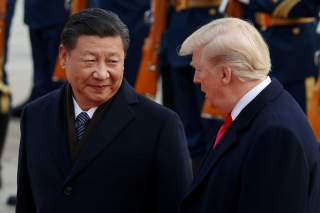Why the White House Has Its Eyes Wide Shut on China
The West can excoriate China all it wants on its debt traps, lack of transparency, and pernicious diplomacy. But unless the West comes up with better solutions, that dirt road, for the developing world, is still a dirt road.
Bangladesh, for instance, has declined Chinese funding for the much needed “20km-long rail and road bridges over Padma river” and has instead opted for “self-generated funds.” Citing China’s “unfair” infrastructure deals by his predecessor, Malaysian prime minister Mahathir bin Mohamad cancelled two projects: the East Coast Rail Link, which would have connected Port Klang on the Straits of Malacca with the city of Kota Bharu, and a natural gas pipeline in Sabah. While the Sabah pipeline project remains annulled, the East Coast Rail Link restarted again only after China agreed to cut the price by nearly $11 billion. Thailand is also working to create a regional infrastructure fund via the Ayeyawady-Chao Phraya-Mekong Economic Cooperation Strategy to reduce reliance on China. While not technically a developing nation (but a “upper-middle income country”), Jamaica has recently decided not to negotiate any new loans from China, citing its commitment to reducing its debt.
It is hard to know whether the United States misinterpreted Chinese BRI intentions, or simply went into the BDN scheme with their eyes wide shut while obscuring the American quest for a new military strategy. Either way, the Brookings Institution’s China’s Belt and Road: The New Geopolitics of Global Infrastructure Development pointed out that while China did recognize a significant infrastructure gap along its periphery, there has never been any secret about the profit motives for the BRI.
Certainly, it is true that the developing world needs infrastructure development. But beyond the Platonic high-mindedness of these ideals, it is not at all clear what better alternative the developing world can expect from BDN since it will have “no lending function” of its own according to the Financial Times. The BRI came in to fill the void because international financial institutions—including the World Bank, the Asian Development Bank, and the African Development Bank, the Inter-American Bank—have largely shifted away from investing in infrastructure development projects. The United States and the West can excoriate China all it wants on China’s debt traps, lack of transparency, and pernicious diplomacy. But unless the United States and the West come up with better solutions, that dirt road, for the developing world, is still a dirt road.
Dr. Patrick Mendis is distinguished visiting professor of global affairs at the National Chengchi University of Taiwan and a senior fellow of the Taiwan Center for Strategic Studies in Taipei. Joey Wang is a defense analyst. Both are alumni of the Kennedy School of Government at Harvard University.
Image: Reuters

